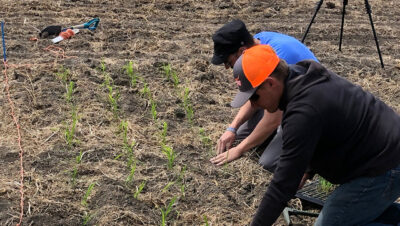Researchers look at growing rice in southern Alberta
By Ry Clarke - Lethbridge Herald Local Journalism Initiative Reporter on August 5, 2022.
 University of Lethbridge photo
Technicians plant rice in the field. Michele Konschuh, a research associate at the University of Lethbridge, is examining the potential of rice crop in the Southern Alberta region.
University of Lethbridge photo
Technicians plant rice in the field. Michele Konschuh, a research associate at the University of Lethbridge, is examining the potential of rice crop in the Southern Alberta region.Michele Konschuh, a research associate in the Department of Biological Sciences at the University of Lethbridge, is working with Galaxy Ag Ventures and Farming Smarter Association to examine the potential of rice crop in the Southern Alberta region. The staple provides valuable resources like rice starch, protein, and oil. According to the Observatory of Economics in 2020 Canada ranked 48th in exports of rice in the world, worth $17.9 million. Rice has quickly become a fast-growing staple in many household diets because of its nutrients and meeting many gluten-free dietary restrictions.
Galaxy Ag Ventures works on new crop development and early-stage investments in the agriculture industry. Approaching Konschuh to look for a more feasible way to grow the crop locally rather than importing the product.
“They came to the University to ask if we could help them explore the opportunity or the possibility. We’re at the very early stages, which is really just proof of concept, we’re trying to see if we can get rice to grow here. And if we can select varieties suitable for our growing conditions,” said Konschuh, noting Alberta has similar climates to parts of China where rice is also grown. Exploring rice’s rotation with other high value crops in the province.
Rice is traditionally grown in standing water but that is primarily done with lowland rice production for convenience, with the crop often being transplanted afterwards.
“It does need water, but it doesn’t need as much water as we picture. Because a lot of the reason rice is grown in standing water is to prevent weeds and pests from getting the crop. So here, if we can find other strategies for weeds and pests, then we can grow rice with about the same amount of irrigation water that would be required for potatoes, sugar beets, or corn,” said Konschuh.
“Here our desire would be to make it mechanized, and to use as little water as possible and get a reasonable return on investment. We have to explore what’s possible here. Starting with a few different lines of rice from a breeder in Korea, we were able to get one of them to go all the way to seed production in spite of our long day length. That was in a greenhouse setting.”
Challenges do arise with growing rice in Southern Alberta, working against longer days and frost conditions.
“Rice typically likes what they call a short daylength. It really needs a long night. In Alberta the growing season we have is longer days of the year with shorter nights. We have the opposite of what rice needs. We might need to find varieties that are photoperiod insensitive, where they produce seeds regardless of the day length. Or we may have to try to manipulate them with a plant growth regulator,” said Konschuh.
“We also have some fairly cool temperatures in the spring. Cold spring soil temperatures can be a problem as well, for rice germination. We may have to work with some seed coatings that would help retain moisture and protect the seed from early frost events. This year we planted after the risk of frost was passed. But that might make our season too short when we come up against frost again in September.”
Depending on the variable rice has a feasible growth period of 90 to 120 days fitting our growing season in Alberta. Working to have a strong start right out of the gate to maximize production is a goal for the project.
Konschuh is excited for the opportunity, learning from the process and eager to see how the next stages of the project unfold.
“One of the reasons for southern Alberta, I think, is that we have a very progressive group of growers here. They’re innovative. They’re always looking to see what things are coming through other countries. Innovative and progressive groups of growers would serve us well. If you’re looking for people to try new things you need people willing to take the risk with you.”
13-12


